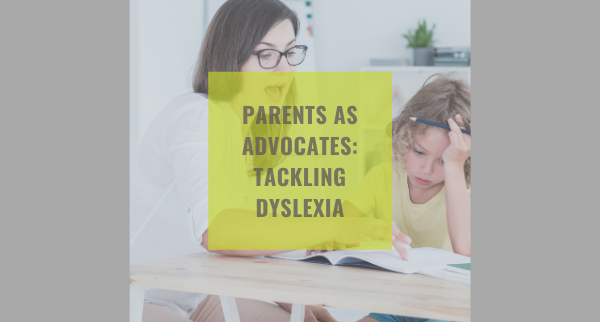Parents as Advocates: Tackling Dyslexia
Parents as Advocates: Tackling Dyslexia
Parents whose children suffer from dyslexia are plenty aware of the struggles their children face on a day-to-day basis. That is why another “A” word can be even more powerful for families—advocacy.
No one knows your child better than you do. Keep this in mind when advocating for your child’s needs. In parents’ efforts not to come across as a “helicopter parent,” they sometimes assume it is in their child’s best interest to follow the expert’s lead, avoid making waves and be passively agreeable. They do not want to be the bulldog. These fears are common, but that doesn’t make them true.
You are your child’s greatest advocate, and here’s how to accomplish that.
Know Your Legal Rights
Under the Individuals with Disabilities Act, our nation’s special education law, children and their parents or guardians are guaranteed certain protections and rights. Once identified as having a qualifying disability, schools are legally required to provide special education services to your child.
Also, under IDEA, the law provides parents with something called procedural safeguards, which are put in place so that parents are aware of and have a voice in every aspect of their child’s special education evaluation and IEP process. As part of the process, the school must provide you with documentation and an explanation of your rights—STUDY UP ON THESE DOCUMENTS.
It is commonplace for IEP meetings to move quickly, with a “sign here if you don’t have any questions” style of rapid wrap-up. It is your job to closely review these documents and to seek clarification before signing anything.
Be Organized
Another best practice for advocacy that goes hand in hand with knowing your child’s legal rights is to stay organized. Keep a binder of all necessary documentation regarding your child’s diagnosis and any other evaluative documents that you accumulate as you work through the process.
Items such as test results, doctor’s notes and recommendations, educator’s observations, report cards, writing samples, and any data concerning your child’s academic skills should be kept for future reference.
The binder is also a great resource for you to use for note taking during IEP or 504 meetings. Not only will you have your own notes to refer back to after the meeting, but the process of taking notes shows that you are actively listening and invested in your child’s special education services. When parents demonstrate this level of involvement and support, it’s the child who benefits.
The binder keeps essential documents organized and acts as a paper trail of progress and correspondence among your child’s team.
Be Prepared
It is also essential for parents to be fully prepared for special education meetings. Because of this, the binder’s benefits are two-fold: paper trail and parent playbook [or however you want to define the two benefits].
Of all members of your child’s academic team, you are the person that knows him best, so your seat at the table matters most. Advocating for your child means preparing questions ahead of time and speaking up if they aren’t answered clearly. Meetings tend to move quickly, so request an additional meeting if you haven’t gotten clear answers.
Do not assume that the team will automatically clarify for you, so be prepared to ask follow-up questions if needed.
Follow up
Another helpful advocacy move is to email a summary of the main discussion points that you took away from the meeting afterwards. This keeps everyone on the same page regarding the decisions that were discussed and allows you to share your own perception of how the meeting went.
If anything is unclear, your email will start that conversation and provide clarification. In that email, ask about a follow-up meeting so that dates can be arranged and any other necessary steps can be taken.
Keep Open Communication with Teachers
Speak to teachers about your expectations, your child’s expectations, and the school’s expectations. This will prevent any miscommunication and unfortunate surprises.
When setting expectations for your child’s success, it is important to be honest, positive, and realistic about the growth that you’d like to see. It will be difficult, but as much as possible, remain unemotional and unbiased about the feedback that you get from your child’s teachers and other professionals—cool heads prevail.








